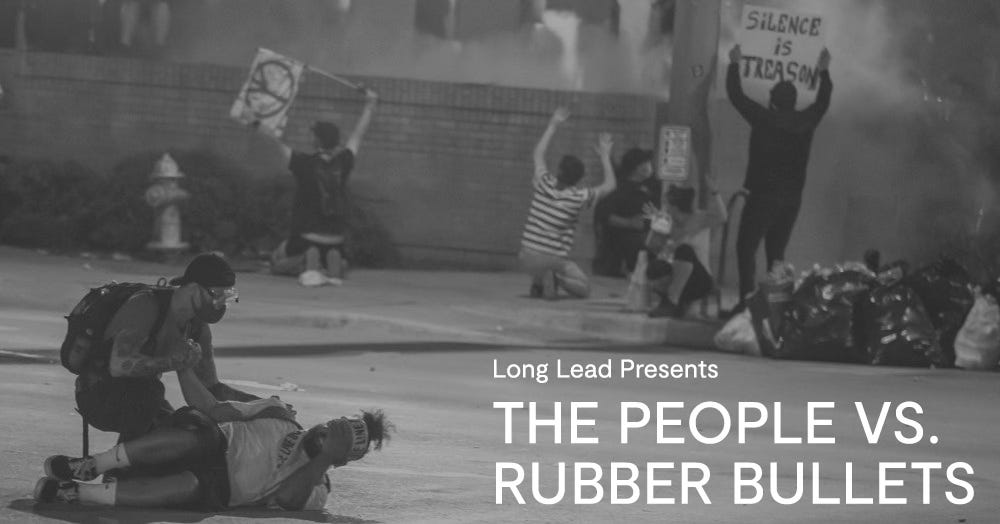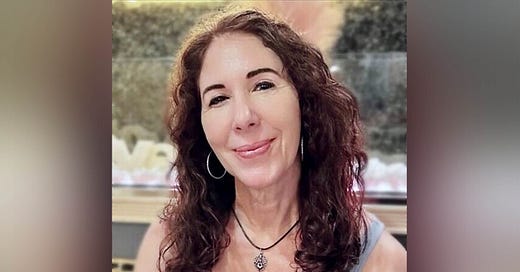“It's very insidious.” Melanie Haiken on reporting out the schemes insurance companies use to limit eating disorder treatment
The longtime freelance journalist talks about her process of writing a devastating four-part series.
Melanie Haiken avoids sticking to a single beat, but there is a throughline in her work: deep reporting.
It’s a talent she developed while getting her master’s in journalism at The University of California, Berkeley and during a follow-up stint working at the Center for Investigative Reporting (CIR). And for the past 25 years, the San Francisco-based writer used this skill to cover everything from J.R.R. Tolkien-inspired travel to environmental issues for an ever-expanding list of publications including Sierra, Afar, National Geographic, and Yoga Journal.
Another one of her core topics: mental health issues like addiction and eating disorders. It’s a beat where Haiken’s professional and personal interests overlap. Her mother was an alcoholic and one of her kids went through years of treatment for anorexia and bulimia.
That combination of professional and personal experience is on full display in Haiken’s recent series for MindSite News, a nonprofit news site founded by Rob Waters and Diana Hembree that focuses on mental health issues. Her four-part series, “Deadly Denials: When Insurers Fail to Cover Treatment for Eating Disorders, People Suffer. Sometimes They Die.,” covers the often pernicious actions of insurance companies on people suffering from eating disorders. The series was supported by a grant from the Pulitzer Center.
In this edition of Depth Perception, Haiken discusses how collaboration with her editors helped her navigate the challenges she faced while reporting, and what it was like covering such a deeply personal and heartbreaking topic. This interview has been edited for conciseness and clarity. —Jenna Schnuer
How did the series come about?
Waters and Hembree came to me with the concept in the spring of 2024. From the beginning, one of MindSite’s areas of expertise has been insurance coverage for mental health. It's a big area of focus for them. They applied to the Pulitzer Center, and they chose eating disorders because it's the deadliest of all mental health disorders. They thought a really good way to highlight problems with parity would be to focus on eating disorders, because the consequences are very extreme. So when I came in, they had already been awarded the grant.
What was the reporting experience like for the series?
Honestly, when I started out, I really thought the story was going to be about insurance denial. I thought I was going to find a bunch of people who tried to get insurance coverage for eating disorders and just got outright denied. Don't get me wrong, I found plenty of people that that happened to and some of the most egregious cases are in the story. But where it morphed was how insidious the whole thing was.
You know, as mental health parity has evolved, insurance companies have gotten smarter. As the laws had tightened [under] Obama and Biden, outright denials got harder for them to do. In many cases it became [about the companies] finding insidious ways to limit treatment.
Here's where having had a daughter in treatment for many, many years in many kinds of programs really helped me. I knew how those programs were structured. I knew most residential treatment programs are structured on a 28-day basis. The insurance companies are doing this thing where they're approving it seven days at a time: “We'll approve you for seven days now. Then you've got to resubmit the whole thing to prove you still need it.”
Your weight starts to come up [and they say], “Oh, you don't need the treatment anymore.” Yep, so it's very insidious. Or, you know, the person's practitioner recommends residential or intensive outpatient [treatment], and then the insurance company says, “Oh, we won't pay for residential. We'll pay for intensive outpatient,” or, “Oh, we won't pay for intensive outpatient. We think the person's fine with once a week therapy and a support group.” They under-provide.
What was it like to conduct interviews for the series?
Honestly, I think some of the saddest interviews I did were with providers running a treatment program. They can see how desperately this person needs help. They've got the person and they've got a course of treatment lined up, and then the insurance company won't cover it.
I did talk to providers who helped some people pro bono under some circumstances, but they can't stay in business doing that. So to have to turn someone away because they don't have coverage? When you, as a provider, can see clearly what they need, it's tragic. I had providers cry on the phone, as well as parents and patients.
“Less lethal” means “still deadly”

As law enforcement and the U.S. military has been deployed to police protests across the country in 2025 — specifically in Los Angeles this week — less-lethal weapons deserve a closer look. For decades, police have championed kinetic impact projectiles as life-saving alternatives to deadly force. Their history, however, tells a different story — one of imprecise science, unmeasured usage, untrained police forces, death, and disfigurement.
With revelatory reporting by Linda Rodriguez McRobbie, stunning original and historical photography, and a captivating multimedia website, “The People vs. Rubber Bullets” tells the full, brutal story of kinetic impact projectiles and their usage, from rubber bullets’ invention in 1970s Northern Ireland all the way through the 2020 Black Lives Matter protests.
This Sigma Delta Chi and Webby Award-winning, six-part, longform feature published by Long Lead examines law enforcement's use of these weapons in crowd control, chronicling a number of less-lethal victims and their struggle for justice. Read the stories of those whose lives were irrevocably changed here: rubberbullets.longlead.com.
Do you think your personal experiences as the parent of someone who had an eating disorder helped you during the interviews?
I think it did. Any good journalist could have reported this story. There were a few instances, at least, speaking especially with parents, where it did help that I was also a parent who had been through this. I do think people opened up to me more because I talked about my own experience, and because I have sat in those support groups. I have had a daughter hospitalized. I've dealt with insurance companies myself. So I do think that it really helped parents to open up to me and to tell me things. We did a lot of commiserating with both of us crying.
How did you handle taking in all of this really difficult information?
I can't tell you the number of times I came slamming out of my office just going like, “Oh my God, you're not gonna believe the story I just heard. This family is so desperate and they can't get help.” Honestly, I talked to several lawyers for this story and [heard] about cases they were taking and how hard it was for them to get help for people. I spent a lot of time pounding walls and taking my dogs for walks.
What surprised you the most during your reporting?
I expected to find more lawyers telling me of really dramatic legal fights. What I found was that the laws have become incredibly complex. The insurers have become incredibly devious and the cases are not as easy to take. The lawyers were also really sad. They have to turn down a lot of cases. A lot of them end up becoming class actions, and a lot of them get settled. And they get settled in a way where it's all hidden and tucked away, where people end up settling and then agreeing not to talk about it.
And then another surprise was how eating disorders present in diverse populations. I didn't know how common they have become in trans youth. I didn't know the ways they can present really differently in anyone who's not white.
“I have had a daughter hospitalized. I've dealt with insurance companies myself. So I do think that it really helped parents to open up to me and to tell me things. —Melanie Haiken
This was a really big story to take on as a freelancer. How did you get it done?
The story really was a collaboration. I was on the phone with Rob [Waters], my editor, over and over again. We had this big roadblock early on, trying to get some data... We ended up brainstorming how to get around this, how to get other data. What I ended up doing was searching for researchers who were researching the topic. We really wanted original data.… We wanted to break ground and there were a number of researchers that had published really groundbreaking studies in the past year or two — really new stuff.
We came up with this idea of interviewing researchers, building relationships and seeing [what] they hadn't published yet [and if] they could give us access to that information. Also, speaking with lawyers, that was another idea [so they could] tell us what they were seeing. We really brainstormed a lot of angles.
There were moments where if I were just home alone, I would have been like, “What do I do now?” Doing this as a collaboration prevented that.
What happens next? Have the insurance companies responded to the story?
I was completely stonewalled by the insurance industry [during reporting]. I reached out to every insurance company mentioned in this story. I told them the points I was making, asked them to speak with me, asked for [a] rebuttal. Not one of them would. I went to the industry organizations. One of them crafted a statement that they gave me by email but didn't speak with me.
I have not heard anything afterwards. I desperately want to say I feel like we broke this wide open, that this is the exploding Pinto. But [the insurance companies] are Teflon. In this new era, I don't know what's going to happen. I mean, I genuinely believe mental health parity is on the line, and I'm terrified. I would love to say the insurance industry is running scared. I think it's the exact opposite, and we've got a lot of work to do.
Further reading from Melanie Haiken
“The Enterprising Woman Who Built—and Lost, and Rebuilt—a Booming Empire During the Klondike Gold Rush” (Smithsonian, Nov. 2024)
“Baby Great White Shark Reveals Huge Nursery Near NYC in Scientific First” (National Geographic, June 24, 2024)
“The Story of Saint Patrick is Way Weirder Than You Think” (The Saturday Evening Post, March 14, 2024)
“Druid Heights: The US’ Hidden LGBTQ+ Community” (BBC Travel, June 21, 2023)
“Following in the Footsteps of J.R.R. Tolkien in Switzerland’s Mystical Lauterbrunnen Valley” (Afar, Sept. 16, 2022)







